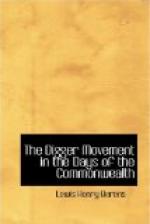Winstanley, then, we regret to say, was ambitious enough to attempt to formulate a whole series of rigid artificial laws, which he evidently deemed adapted to promote the prosperity and preserve the happiness of his ideal Commonwealth: laws for the planting of the Earth, for Navigation, Trade, Marriage, etc. etc. The curious reader will find them almost in full in Appendix C. Many of them may seem to us unnecessary, but then we should remember that we have at our command a greater store of economic knowledge, and more accurate economic reasoning, than were available to Winstanley. Many of his laws will appear to us unnecessarily severe; but if we compare them with those prevailing for many, many years after his time, they will appear, by comparison, both mild and humane. As it seems to us, Winstanley intended to formulate suggestions rather than Laws in the accepted sense of the term: suggestions by following which the Earth could be planted and harvested, and all handicraft, trade, commerce and industries carried on, and the fruits of the united labours of all equitably distributed amongst all according to their needs, without having recourse to “the thieving art of buying and selling” either the Earth or the fruits thereof.
The pamphlet concludes with the following quaint and yet philosophic lines, with which our notice of it may also fittingly close:
“Here is the Righteous
Law, Man wilt thou it maintain?
It may be, as hath still,
in the World been slain.
Truth appears in Light,
Falsehood rules in Power;
To see these things
to be, is cause of grief each hour.
Knowledge, Why didst
thou come, to wound and not to cure?
I sent not for thee,
thou didst me inlure.
Where knowledge does
increase, there sorrows multiply,
To see the great deceit
which in the World doth lie.
Man saying one thing
now, unsaying it anon,
Breaking all Engagements,
when deeds for him are done.
O Power where art thou?
thou must mend things amiss;
Come, change the heart
of Man, and make him Truth to kiss:
O Death, where art thou?
wilt thou not tidings send?
I fear thee not, thou
art my loving friend.
Come take this body,
and scatter it in the Four,
That I may dwell in
One, and rest in peace once more.”
CHAPTER XVII
CONCLUDING REMARKS




